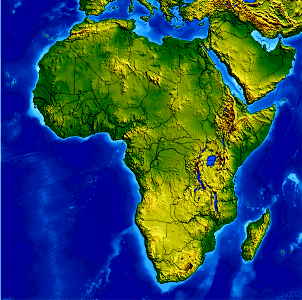Deliverance Ministry in an African Cultural Perspective, by Jim Harries
Advice being given in deliverance ministry in Western nations is quite different. Burnard tells us that “Neil Anderson, now one of the widest read authors and acceptable to those of a charismatic and conservative evangelical position, emphasises truth and faith, alongside self-deliverance from demonic spirits” (2001:64). Anderson says the following: “therapists should be getting their information from the Holy Spirit, the spirit of truth [as it is] … truth that will set them free … Setting a captive free is better understood as a truth encounter … it is never our responsibility to defeat the devil; Jesus has already done that …” (2000:124). If judged by these or similar Western writers on deliverance, many African practices of deliverance seem to be marginal or even beyond the pale.
 A basic difference seems to be that the West perceives ‘truth’ to be other than confined to the spiritual realm. ‘Truth’ as Anderson perceives it, is presumably historically-known truth about Jesus Christ that is confirmed by the Scriptures. The West has a strong notion of absolute or objective truth. Not so Africa, or at least not in Kenya. Blunt (2004:318) points out that for Kenyan Pentecostals “the senses can no longer determine the true nature of things or people”. An encounter of truth with spiritual forces is likely to be much less significant for an African, for whom that which has the greatest spiritual force in the light of demonic or other attack may be thereby considered to be ‘the truth’.
A basic difference seems to be that the West perceives ‘truth’ to be other than confined to the spiritual realm. ‘Truth’ as Anderson perceives it, is presumably historically-known truth about Jesus Christ that is confirmed by the Scriptures. The West has a strong notion of absolute or objective truth. Not so Africa, or at least not in Kenya. Blunt (2004:318) points out that for Kenyan Pentecostals “the senses can no longer determine the true nature of things or people”. An encounter of truth with spiritual forces is likely to be much less significant for an African, for whom that which has the greatest spiritual force in the light of demonic or other attack may be thereby considered to be ‘the truth’.
A Western approach to deliverance may not be appropriate for lively and noisy East Africa with its perception of numerous witches and spirits. A populous accustomed to elaborate rituals and vigorous dancing to the beating of noisy drums in hot sweaty rooms, may not be impressed by the quiet tone and smile of an orderly Western-style deliverance event. The political correctness often inherent in Western teaching will seem to be stripped of power in comparison to what Africans are accustomed.
So then how should deliverance be practiced? Perhaps we ought to say that practices related to casting out demons in East Africa are ‘all wrong’? That sounds rather imperialistic. Perhaps they are ‘wrong’ in the West, and Africa has got it right? Of course both may be ‘wrong’—but is one side more ‘wrong’ than the other? Perhaps we need to recognise that it is important to consider the context in deciding what means are appropriate. Then we must concede that teaching on deliverance ministry in Europe arises from an understanding of the Scriptures acquired through a particular context and may only be appropriate in a particular context. If this is the case, then for Europeans to teach Africans how to carry out deliverance ministry is to mislead them. Frankly, the alternative is to say that the African church is misled, not guided by the Holy Spirit, junior in status, or ignorant. This would keep the European and Western church in the position of tutor and the African church as under tutelage for many years to come. If the African church is ‘apprentice church’ and not capable of (with God’s help) guiding itself—then can it (in Protestant terms) be considered to be church at all?
Western missionaries who want to make a stir in Africa often do so by provoking the spirit world. Reinhard Bonnke’s preaching intentionally identifies with this; he readily acknowledges that spirits and witchcraft are there, and need to be overcome by the power of Jesus. “For Bonnke … human beings are totally evil and depraved … ‘witchcraft’ is the only category which Bonnke can treat of [African culture]” (Gifford 1992:162-163). Hoffman has explained that to have an impact on a village, one’s entry should take the form of a powerful prayer aimed at troublesome spirits. He ‘enjoyed’ much demon casting in Zambia and ‘planted’ many churches in the process. To him, when he arrived on the scene, the Zambians had “finally found someone who knew how to cast out demons” (Hoffman 2008).
Category: Ministry, Pneuma Review, Winter 2011


